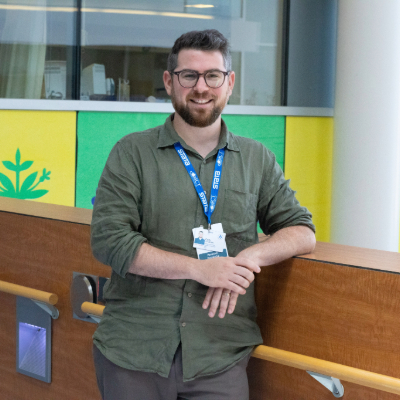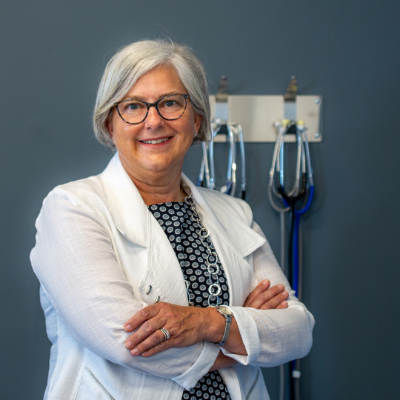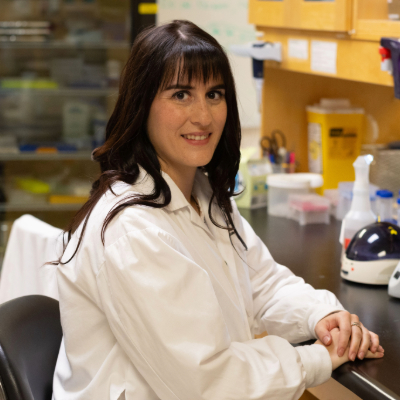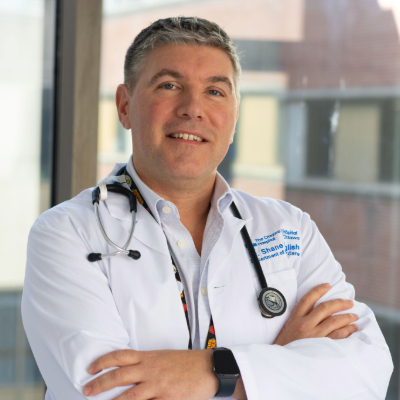Each year, The Ottawa Hospital and its Research Institute honour a select number of outstanding researchers for discoveries and innovations that are improving patient care at TOH and advancing science around the world. This year’s honourees have led game-changing discoveries and clinical trials in areas such as bioethics, patient engagement, brain behaviour and aneurysms.
Meet them here:
Putting ethics at the heart of clinical trials
 Dr. Cory GoldsteinDr. Cory Goldstein didn’t set out to become a clinical trials expert—his journey began in philosophy, exploring questions around autonomy and consent. But today, as a postdoctoral fellow with Dr. Monica Taljaard, he’s helping shape how clinical trials are designed and conducted around the world. Dr. Goldstein focuses on the ethics of randomized controlled trials that use complex designs to evaluate the effectiveness of treatments, policies and practices in real-world health-care settings. His main project is to update the 2012 Ottawa Statement, the first and only international ethics guidelines specific to cluster randomized trials. He previously led the development of ethics guidance for cluster randomized dialysis trials, co-created with patient partners. Published in Kidney International and endorsed globally, Dr. Goldstein received the 2024 uOttawa Faculty of Medicine Best Paper Award for this work. He also earned uOttawa’s Faculty of Medicine Excellence in Mentorship Award in 2023. For his outstanding work in research ethics and patient engagement, Dr. Goldstein is receiving the Grimshaw Researcher in Training Award. Learn more about him in this Q&A.
Dr. Cory GoldsteinDr. Cory Goldstein didn’t set out to become a clinical trials expert—his journey began in philosophy, exploring questions around autonomy and consent. But today, as a postdoctoral fellow with Dr. Monica Taljaard, he’s helping shape how clinical trials are designed and conducted around the world. Dr. Goldstein focuses on the ethics of randomized controlled trials that use complex designs to evaluate the effectiveness of treatments, policies and practices in real-world health-care settings. His main project is to update the 2012 Ottawa Statement, the first and only international ethics guidelines specific to cluster randomized trials. He previously led the development of ethics guidance for cluster randomized dialysis trials, co-created with patient partners. Published in Kidney International and endorsed globally, Dr. Goldstein received the 2024 uOttawa Faculty of Medicine Best Paper Award for this work. He also earned uOttawa’s Faculty of Medicine Excellence in Mentorship Award in 2023. For his outstanding work in research ethics and patient engagement, Dr. Goldstein is receiving the Grimshaw Researcher in Training Award. Learn more about him in this Q&A.
Helping patients make informed choices that matter
 Dr. Dawn StaceyDr. Dawn Stacey has spent her career as a senior scientist and nurse making health care more compassionate, collaborative and clear. Her work has helped millions of patients and families around the world feel more confident and supported when facing difficult health decisions. She led the development of the COSTaRS symptom triage guides, which have improved cancer symptom management and reduced emergency visits by up to 35 per cent. Her Ottawa Personal Decision Guide, available in 15 languages, is used globally to help patients navigate complex choices. She also helped establish international standards for patient decision aids, now adopted in countries like Norway, Australia, and the United Kingdom. Dr. Stacey’s tools and frameworks are embedded in clinical practice, hospital systems, and health policies across Canada and beyond. Her work has been cited in more than 120 clinical guidelines and has shaped how health professionals engage with patients in everyday care. For her pioneering contributions to shared decision making and patient-centered care, Dr. Stacey is receiving the Grimes Career Achievement Award. Learn more about Dr. Stacey in this Q&A.
Dr. Dawn StaceyDr. Dawn Stacey has spent her career as a senior scientist and nurse making health care more compassionate, collaborative and clear. Her work has helped millions of patients and families around the world feel more confident and supported when facing difficult health decisions. She led the development of the COSTaRS symptom triage guides, which have improved cancer symptom management and reduced emergency visits by up to 35 per cent. Her Ottawa Personal Decision Guide, available in 15 languages, is used globally to help patients navigate complex choices. She also helped establish international standards for patient decision aids, now adopted in countries like Norway, Australia, and the United Kingdom. Dr. Stacey’s tools and frameworks are embedded in clinical practice, hospital systems, and health policies across Canada and beyond. Her work has been cited in more than 120 clinical guidelines and has shaped how health professionals engage with patients in everyday care. For her pioneering contributions to shared decision making and patient-centered care, Dr. Stacey is receiving the Grimes Career Achievement Award. Learn more about Dr. Stacey in this Q&A.
Connecting the dots between brain blood vessels and autism
 Dr. Julie OuelletteDr. Julie Ouellette has always been fascinated by the brain, but her research has taken her deep into the blood vessels that support it. As a PhD student in Dr. Baptiste Lacoste’s lab, Dr. Ouellette explored how vascular and metabolic changes contribute to autism spectrum disorders, particularly in individuals with a deletion in the 16p11.2 region of the genome. Her early work led to a first-author publication in Nature Neuroscience and laid the foundation for a series of impactful studies. Her research has introduced a transformative new model for understanding autism, revealing that endothelial cell dysfunction may partially drive the disorder. Beyond the lab, Dr. Ouellette has been a dedicated mentor and active member of the OHRI and uOttawa research community, known for her leadership, collaboration and commitment to science communication. For her cutting-edge research and contributions to the neuroscience community, Dr. Ouellette is receiving the Worton Researcher in Training Award. Learn more about Dr. Ouellette in this Q&A.
Dr. Julie OuelletteDr. Julie Ouellette has always been fascinated by the brain, but her research has taken her deep into the blood vessels that support it. As a PhD student in Dr. Baptiste Lacoste’s lab, Dr. Ouellette explored how vascular and metabolic changes contribute to autism spectrum disorders, particularly in individuals with a deletion in the 16p11.2 region of the genome. Her early work led to a first-author publication in Nature Neuroscience and laid the foundation for a series of impactful studies. Her research has introduced a transformative new model for understanding autism, revealing that endothelial cell dysfunction may partially drive the disorder. Beyond the lab, Dr. Ouellette has been a dedicated mentor and active member of the OHRI and uOttawa research community, known for her leadership, collaboration and commitment to science communication. For her cutting-edge research and contributions to the neuroscience community, Dr. Ouellette is receiving the Worton Researcher in Training Award. Learn more about Dr. Ouellette in this Q&A.
Changing how the world treats brain aneurysm patients
 Dr. Shane EnglishDr. Shane English is helping rewrite the playbook for treating patients with aneurysmal subarachnoid hemorrhage, a life-threatening type of brain bleed. As Principal Investigator and first author of the international SAHARA trial, Dr. English led the largest study to date on red blood cell transfusion strategies in this population. The results, published in the New England Journal of Medicine, are already influencing clinical guidelines and sparking global conversations about best practices in neurocritical care. But Dr. English’s impact goes far beyond the trial itself. He is leading an international effort to develop a Core Outcome Set for subarachnoid hemorrhage research, ensuring that future studies measure what matters most to patients and families. He is also a passionate mentor and clinical leader, known for building inclusive research teams and empowering trainees, nurses and patient partners alike. For his groundbreaking contributions to research and patient-centered science, Dr. English is receiving the Chrétien Researcher of the Year Award. Learn more about Dr. English in this Q&A.
Dr. Shane EnglishDr. Shane English is helping rewrite the playbook for treating patients with aneurysmal subarachnoid hemorrhage, a life-threatening type of brain bleed. As Principal Investigator and first author of the international SAHARA trial, Dr. English led the largest study to date on red blood cell transfusion strategies in this population. The results, published in the New England Journal of Medicine, are already influencing clinical guidelines and sparking global conversations about best practices in neurocritical care. But Dr. English’s impact goes far beyond the trial itself. He is leading an international effort to develop a Core Outcome Set for subarachnoid hemorrhage research, ensuring that future studies measure what matters most to patients and families. He is also a passionate mentor and clinical leader, known for building inclusive research teams and empowering trainees, nurses and patient partners alike. For his groundbreaking contributions to research and patient-centered science, Dr. English is receiving the Chrétien Researcher of the Year Award. Learn more about Dr. English in this Q&A.
